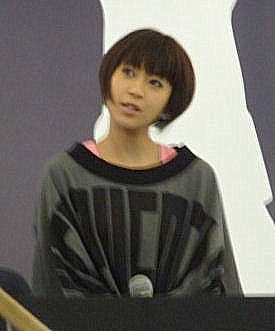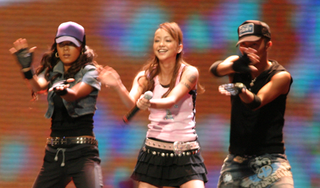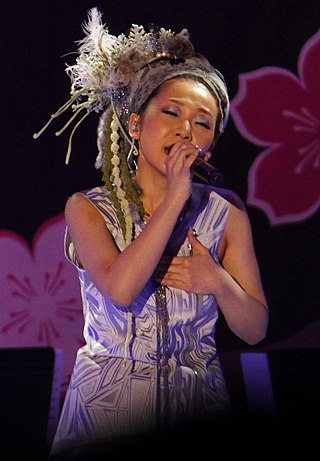
Japanese singer Ayumi Hamasaki has released eighteen studio albums, five compilation albums, twenty-six remix albums, four live albums and numerous singles and promotional singles. She debuted in 1995 under Nippon Columbia with the stage name Ayumi, releasing an extended play Nothing from Nothing, which was a collaboration with Dohzi-T and DJ Bass. Three years later, Hamasaki debuted again as a singer under Avex Trax with the single "Poker Face" (1998). Her first album A Song for ×× (1999) debuted at number one on Oricon's albums chart, and sold over 1.4 million copies.

The discography of Japanese-American R&B and pop singer Hikaru Utada consists of eleven studio albums, three compilation albums, eleven video albums and numerous singles and promotional singles. Utada began as a musician in the early 1990s as a member of U3, a family unit made up of her, her mother Junko Utada, also known as 1970s enka singer Keiko Fuji, and her father, musical producer Teruzane Utada. U3 released their debut album Star in 1993, with the hope to debut in America. In 1996, the group was rebranded as Cubic U, an R&B project focusing on Hikaru Utada, resulting in the English language album Precious in 1998 with record label Toshiba EMI.

The solo discography of Ringo Sheena features seven studio albums, five compilation albums, two extended plays and twenty-seven singles. Signing with Toshiba-EMI in 1998, Sheena released her debut single "Kōfukuron" in May 1998, when she was 19 years old. She subsequently released the singles "Kabukichō no Joō" and "Koko de Kiss Shite", the latter becoming her first hit. As of 2014, Sheena has been signed with EMI Records following EMI Music Japan being absorbed into Universal Music Japan.

The discography of Namie Amuro contains 12 studio albums, 7 compilation albums, 47 singles, 10 live albums, 14 video albums and 102 music videos. Amuro has also collaborated with Verbal of M-Flo and Ryōsuke Imai for her Suite Chic project.

The discography of Japanese R&B singer Misia consists of nine studio albums, three compilation albums, one extended play (EP), one live album, six remix albums, twenty-six singles, twelve promotional singles, eighteen video albums and thirty-seven music videos. In 1997, Misia signed a recording contract with BMG Japan and joined the then up-and-coming talent agency, Rhythmedia. Under the sub-label Arista Japan, Misia released her first single, "Tsutsumikomu Yō ni..." in February 1998, followed by "Hi no Ataru Basho" in May. In June, her debut album, Mother Father Brother Sister, opened at number three on the Oricon chart. The album peaked at number one three weeks later and stayed in the top five for eleven consecutive weeks. Mother Father Brother Sister was certified double million and won a Japan Record Award for Best Album, as well as a Japan Gold Disc Award for Pop Album of the Year. In 2000, Misia's second studio album, Love Is the Message, debuted at number one and was certified double million. It won a Japan Record Award for Best Album and a Japan Gold Disc Award for Pop Album of the Year. The album spawned three top ten hits: "Believe," "Wasurenai Hibi" and "Sweetness." Misia's first remix album, Misia Remix 2000 Little Tokyo, was released three months later and shot to number one. It sold over 800,000 copies and is the second best-selling remix album of all time in Japan.
The discography of Japanese singer Mai Kuraki consists of fifteen studio albums, six compilation albums, twenty-three video albums, three remix albums, fifty-six singles, and sixteen promotional singles. Kuraki debuted in 1999, while she was still in high school, through Giza Studio. The label initially marketed Kuraki in the United States under the name Mai K, and released the single "Baby I Like" (1999). However, the single was a commercial failure which prompted the label to send her back to Japan. There, they released her single "Love, Day After Tomorrow", which peaked at number two on the Oricon Singles Chart and was certified million by the Recording Industry Association of Japan (RIAJ). The second single, "Stay by My Side" became her first number one single on the chart. Kuraki's debut album, Delicious Way, topped the Oricon Albums Chart and was certified triple million by the RIAJ.
The discography of Japanese R&B and pop singer Ken Hirai consists of ten studio albums, two compilation albums, one remix album, three cover albums, thirteen video albums and numerous singles and promotional singles. Hirai debuted as a musician under Sony Music Records in 1995 with the single "Precious Junk", but found success five years later with the single "Lakuen" and his third album, The Changing Same.
The discography of Japanese group KinKi Kids consists of 17 studio albums, 6 compilation albums, 25 video albums and 44 singles. All of KinKi Kids' singles have reached number one in Japan on Oricon charts. All of their music has been released by Johnny's Entertainment in Japan. In Taiwan, Kinki Kids' music has been released under Forward Music from 1997 to 2000, Skyhigh Entertainment and What's Music in 2001, and Avex Taiwan from 2002 to the present.

The discography of Japanese recording artist and actor Masaharu Fukuyama consists of ten studio albums, four compilation albums, three remix albums, twenty video albums, and numerous physical and promotional singles. Fukuyama debuted through BMG Japan by releasing the single "Tsuioku no Ame no Naka" (1990) and the album Dengon. The works failed to chart, however, in 1992 the single "Good Night", aided by the popularity it gained through use in the drama Ai wa Dō da, charted on the Oricon Singles Chart, peaking at number nine. In 1993, his album Calling became his first number one album on the Oricon Albums Chart; it has sold over 850,000 copies in Japan and has been certified two-times platinum by the Recording Industry Association of Japan (RIAJ).
The discography of Japanese musical act Rip Slyme consists of ten studio albums, four compilation albums, two extended plays, one live album, eight video albums and thirty-three singles. Rip Slyme debuted as an independent act on File Records in 1995, releasing material with them until their major label debut under Warner Music Japan in 2000. The band's second album under Warner, Tokyo Classic (2002) was a commercial success, selling over 1,000,000 copies.
The discography of M-Flo features nine studio albums, nine compilation albums, one live album and 25 singles. These were released on Labsoul Records and Avex Group independent label Rhythm Republic in 1998, and from 1999 onwards released through Rhythm Zone.
The discography of Japanese rock band The Brilliant Green consists of five studio albums, compilation album and 20 singles. These were released through Sony Music Records from 1997 until mid 2000, when the band moved to Sony sub-label Defstar Records. The Brilliant Green parted with Sony in 2008 after releasing the compilation album Complete Single Collection '97–'08, and began releasing music through Warner Music Japan from 2010 onwards.
The discography of Chihiro Onitsuka consists of six studio albums, one cover album, five compilation albums, 20 singles and seven video albums. These were released under Toshiba EMI between 2000 and 2003, Universal Music Japan from 2004 to 2010, For Life Music Entertainment from 2011 to 2012, and on her personal record label, Napoleon Records, from 2013.
The discography of Japanese actress and singer-songwriter Takako Matsu includes ten studio, three compilation, two live, seven video albums, twenty-one singles, and twenty music videos. Born into a family of actors, Matsu made her debut as a stage performer before her roles in TV dramas and films. That year she released her first single, "Ashita, Haru ga Kitara", which peaked at number 8 on the Oricon Singles Chart and was certified platinum by the Recording Industry Association of Japan (RIAJ) for shipments of 400,000 copies. Matsu's debut album, Sora no Kagami, peaked at number 4 on the Oricon Albums Chart. Selling over 300,000 copies, it earned a platinum certification from the RIAJ and Matsu was named Best New Artist of the Year at the 12th Japan Gold Disc Awards.
The discography of Japanese pop duo Dreams Come True consists of 20 studio albums, 6 compilation albums, 17 video albums, and numerous singles. The band was formed in 1988 by Miwa Yoshida, Masato Nakamura, and Takahiro Nishikawa as Cha-Cha & Audrey's Project, which was later changed to Dreams Come True. The first single "Anata ni Aitakute" did not chart, but their eponymous debut album sold over a million copies in Japan and was certified Million by the Recording Industry Association of Japan (RIAJ). The follow-up albums also performed well on the charts, with the 1989 release Love Goes On... lingering on the Oricon Albums Chart for four years. The group's fifth studio album The Swinging Star (1992) was at one point, the best-selling album in Japan, shifting over 3.7 million copies in the country.
The discography of Japanese singer Masayuki Suzuki includes 16 studio, 6 compilation, 4 cover albums, a live album, 10 video albums, and 36 singles. Inspired by Western R&B acts and doo-wop songs, Suzuki formed a band Chanels in 1975, along with his friends and released their debut single "Runaway". Chanels would later be renamed to Rats & Star. In 1986, Suzuki made his solo debut through Mother of Pearl.
The discography of Japanese pop singer Bonnie Pink consists of thirteen studio albums, three compilation albums, one live album, two extended plays one soundtrack and forty-two singles.
The discography of the Japanese pop duo Chage and Aska consists of 21 studio albums, 14 compilation albums, 26 video albums and 55 singles. Chage and Aska debuted in 1979 with the single "Hitorizaki", which peaked at number 24 on the Oricon Singles Chart. In 1980, their single "Banri no Kawa" was their first chart hit. Their 1991 single, "Say Yes", which was used as the theme to the Japanese drama The 101st Marriage Proposal (101回目のプロポーズ), sold two million copies and is the sixth best-selling single of all time in Japan. The group had another double million seller in 1993 with "Yah Yah Yah". The group has sold about 31 million records in Japan.
The discography of Japanese boy band SMAP consists of 21 studio albums, 5 compilation albums, 23 video albums, and numerous singles. Sports Music Assemble People, abbreviated as SMAP, was formed in 1988 by a group of backup dancers for the boy band Hikaru Genji of Johnny & Associates. The band's initial releases performed poorly on the charts, but the following ones started gaining attention, aided by the group's appearance on their own variety show, SMAP×SMAP. Meanwhile Kimi Iro Omoi single was used in anime Akazukin Chacha broadcast in Japan only. In worldwide broadcast, Kimi Iro Omoi single was replaced by Shoko Sawada. However, that single can only available on MP3 Store, then download between TV Size and Full version. Their 2003 single "Sekai ni Hitotsu Dake no Hana" sold over two million copies in Japan, becoming one of the best-selling singles in the country. In August 2016, the group announced that they will disband by the year end. Since 2003, all of the band's releases have peaked at number one on the Oricon Albums or Singles Chart. The group has sold over 38,5 million records in Japan.
The discography of Japanese singer-songwriter Kazumasa Oda consists of ten studio albums, four compilation albums, two cover albums, three video albums, and thirty solo singles. Oda began his career as a performer of the folk-rock band Off Course. He began releasing solo material in 1985. His 1991 single "Oh! Yeah!" / "Love Story wa Totsuzen ni" topped the Oricon Singles Chart and was certified two-times million by the Recording Industry Association of Japan (RIAJ). When his 2016 compilation album Ano Hi Ano Toki topped the Oricon Albums Chart, Oda became the oldest artist in the country to achieve the accomplishment.






